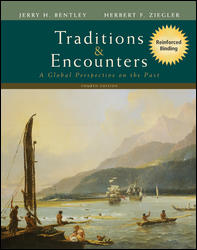Traditions and Encounters, 4th Edition (Bentley)Chapter 38:
THE BIPOLAR WORLDOverviewTwo superpowers emerged from the ashes of the Second World War, the United States and the Soviet Union. Former allies, the two were now actively hostile, but they repeatedly stopped short of a full-out war. The prospect of a nuclear confrontation was too awful to contemplate. The cold war was characterized by the following: - The arms race. The logic of the cold war drove both superpowers to stockpile nuclear weapons in order to match one another's destructive capabilities. The two powers were evenly matched in the 1960s, but by the 1980s the effort had severely strained the Soviet economy.
- Bipolar alliances. The cold war saw new defensive alliances, NATO in the west and the Warsaw Pact of the Soviet satellites. The world was divided into two camps, and the "third world" nations were courted and pressured to join one or the other. Some states, such as France and Yugoslavia, demonstrated that it was possible to avoid such entanglements. The People's Republic of China turned briefly to the Soviet Union for support, but broke free after 1964.
- Aggressive saber-rattling. Although the superpowers avoided direct and full-scale war, a number of minor conflicts sapped their energies and resources: Berlin, Korea, Hungary, Cuba, and Czechoslovakia. The United States fought a long and ultimately futile war in Vietnam. The Soviet Union was likewise drawn into a civil war in Afghanistan. Both these campaigns failed.
- The failure of communism. As an economic system, Soviet communism provided a shabby equality for all, with few consumer goods and limited opportunities. In contrast, the postwar decades saw unprecedented prosperity in the United States, Europe, and Japan. Overall the standard of living in the capitalist societies improved dramatically, although there were greater extremes of wealth and poverty.
- The collapse of the Soviet Union. The breakdown of the Soviet Union, while a long time coming, was swift and unexpected when it came. Between 1989 and 1991, the Soviet Empire completely unraveled, and the cold war ended.
 | 
















